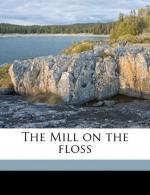|
This section contains 7,784 words (approx. 26 pages at 300 words per page) |

|
SOURCE: "The Mill on the Floss," in Particularities: Readings in George Eliot, Ohio University Press, 1983, pp. 58-74.
In the following essay, first published in 1970 in her Critical Essays on George Eliot, Hardy explores the conclusion of The Mill on the Floss as an example of authorial fantasy.
I take it that The Mill on the Floss is the novel most visibly close to George Eliot's life. As in many novels loosely classed as autobiographical, this closeness to life has advantages and disadvantages, and shows itself in various ways. It creates the loving and seemingly accurate chronicle of actual events; the successfully externalized conscious and unconscious disguise and transformation; and the glib, inventive fantasy of dreaming and wishing. I am separating these processes for the purpose of announcing my analysis, but the novel blurs the edges and blends the kinds. It is a novel where the author is recalling...
|
This section contains 7,784 words (approx. 26 pages at 300 words per page) |

|


